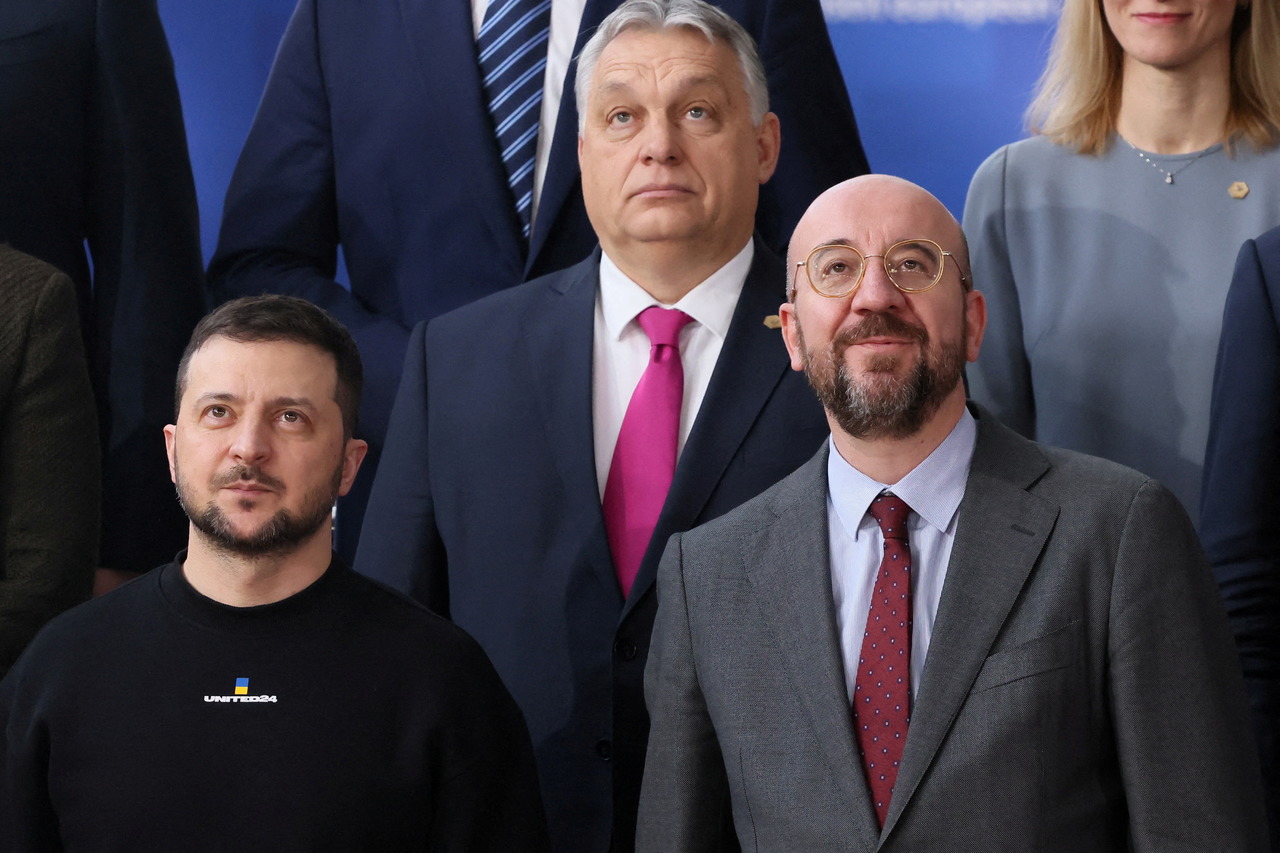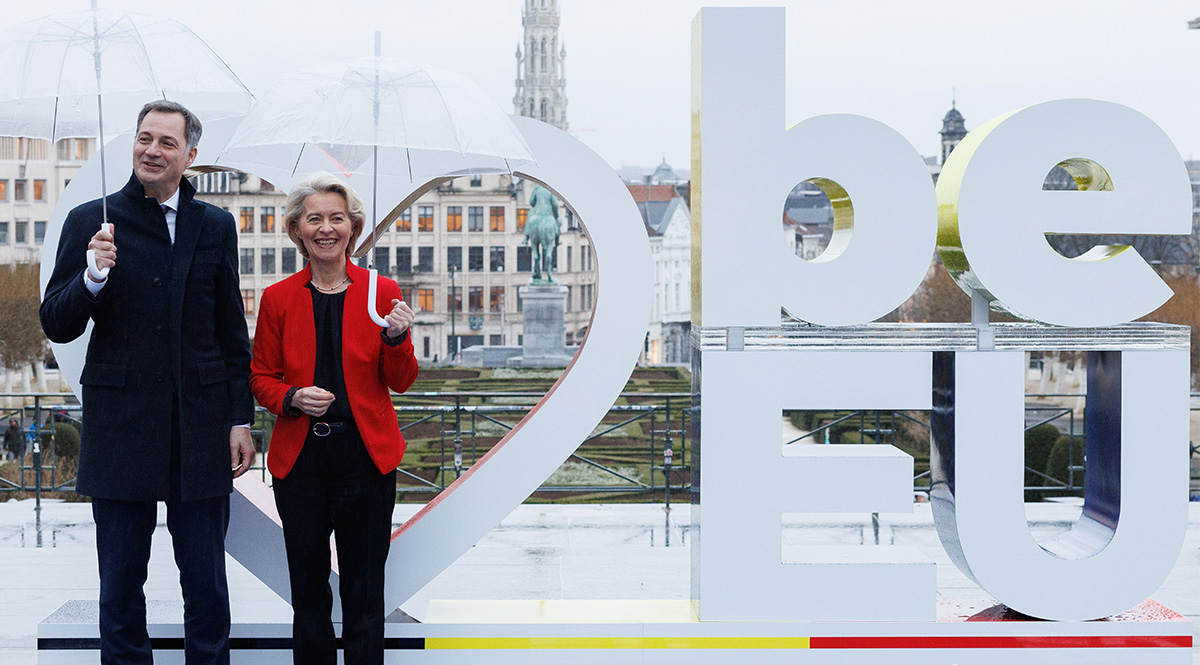"Make Europe Great Again" - Hungary Takes Up EU Council Presidency
On 1 July, Hungary assumed the presidency of the Council of the EU from Belgium. This is the first time this function has been held by a country under the Article 7 procedure of the Treaty on European Union. Prime Minister Viktor Orbán seems intent on using the opportunity to strengthen his government’s position at home, pushing his own vision of EU development, and speaking to non-EU partners, ostensibly from the position of the entire Union. It is in Poland’s interest to oppose Hungary’s misuse of the presidency to discredit the EU and limit aid to Ukraine.
.png) Evgenia Novozhenina / Reuters / Forum
Evgenia Novozhenina / Reuters / Forum
Programmatic Goals
The presidency programme is focused on seven priorities: competitiveness, defence, enlargement policy, migration, cohesion policy, agriculture, and demography. The emphasis on economic issues is related to the presidency’s negotiations of a new competitiveness deal, which is intended, among other things, to deepen the internal market and support small and medium-sized enterprises. To a large extent, the presidency is also looking at defence through the prism of economic development. This is evidenced, among other things, by the announcement of coordination of further work on the European Defence Industry Program (EDIP), including the criteria for companies to access funds through it. In addition, the presidency will emphasise the need for greater protection of farmers’ interests and will link food security to the EU’s strategic autonomy. In cohesion policy, the Hungarian authorities see an opportunity to reduce intra-EU economic disparities, and thus to improve the functioning of the Union’s internal market.
The priority of EU enlargement is primarily concerned with supporting the accession efforts of the Western Balkan countries. Hungary’s policy to date indicates that, especially in the case of Serbia, where the government has a similar ideological profile to Hungary’s and has seen democratic standards regress over the years, progress in European integration does not necessarily have to be based on reforms. Hungary is reluctant to deal with Ukraine’s accession, which is an exception in the EU. In its presidency programme, Hungary makes enlargement contingent on protecting the rights of national minorities, which the Orbán authorities argue is what is impeding Ukraine’s closer Euro-Atlantic integration.
The demographic and migration issues highlighted in the presidency programme are consistent with elements of the Hungarian authorities’ communications. That government holds annual demography summits in Budapest and uses them to build a narrative for domestic use, as well as for consultations with political and external partners. It promotes the view that the problem of a declining population should not be solved by intensifying migration. At the EU level, it also advocates more effective deportations in cooperation with non-EU countries and sealing the Union’s external borders, while expanding the Schengen zone.
External Policy
The Hungarian prime minister proclaims that one of the goals of the presidency is to “bring Europe closer to peace”. To reinforce such a narrative, which serves to justify his refusal to provide military support to Ukraine, he visited Kyiv (for the first time in 12 years) on the second day of Hungary’s Council presidency and Moscow a few days later. He suggested to the Ukrainian authorities that a ceasefire can be reached with Russia, preceding peace negotiations. Orbán not only failed to consult this proposal—which was rejected by the Russian and Ukrainian presidents—with his EU counterparts but also concealed from them his intention to make these visits. As a result, the EU institutions denied that the visits took place on behalf of the Union.
The presidency programme devotes little space to support for Ukraine, limiting itself mostly to reconstruction. So far, Hungary has obstructed assistance to it at the EU level, exposing itself to criticism from other Member States. According to calculations by Lithuanian Foreign Minister Gabrielius Landsbergis from this spring, Hungary has blocked around 41% of EU decisions to support Ukraine. Moreover, in order to obtain concessions from the EU, Hungary slowed the imposition of sanctions on Russia. The approval of the 14th package of restrictions in June this year was accompanied by an exception for Hungary’s Paks nuclear power plant, which is being expanded by Russia’s Rosatom.
The presidency envisions strengthening the EU’s global position through rapprochement with third countries. This is to apply primarily to states with which Hungary has strong bilateral relations, including China, Turkey, and Israel. Orbán is pushing for closer political and economic relations with China, as underscored by his presence at the Belt and Road Initiative forum in Beijing last October, the only EU leader to participate. The presidency promises a “pragmatic and balanced approach towards China”. This formulation, however, contrasts with the strategy pushed by the European Commission (EC) to reduce dependence on China (derisking). The Hungarian government is promoting the view that China could help end the Russian-Ukrainian war. This is why Orbán travelled to Beijing in the first days of the presidency. In contrast, the presidency programme pays little attention to the United States, whose administration has criticized Orbán’s rule. He in turn, appears to want, Donald Trump to return as U.S. president, as reflected in the presidency’s motto “Make Europe Great Again”, modelled on Trump’s famous slogan and signalled by a meeting between the two politicians immediately after the NATO summit in Washington.
Hungary’s Position in the EU
At a time when the composition of EU institutions, including the EC and the European Parliament (EP), is being renewed, the Hungarian government sees the role of the presidency as a stabilising force in the EU. Exercising power, however, will be difficult due to disputes with Member States and conflicts with EU institutions. Orbán’s visit to Moscow was criticised by both EU institutions and many Member States (only the Slovak authorities supported it). Hungary’s position in the organisation is also not helped by the anti-EU rhetoric of its prime minister, who blames the Union for contributing to the continuation of the war through the military support for Ukraine, pushed for by, among others, Poland, as well as “uncontrolled” migration.
Orbán’s Fidesz won the June EP elections in Hungary with 44.8% of the vote. The party (in alliance with the Christian Democratic People’s Party) will bring 11 of Hungary’s 21 MEPs (two fewer than in the last term) to the next EP. Fidesz compensated for leaving the European People’s Party (EPP) in the previous term by forming a new group called the “Patriots for Europe”. It was founded on the eve of Hungary assuming the Council presidency with political allies from neighbouring countries—the ANO of former Czech Prime Minister Andrej Babiš and the Freedom Party of Austria. The announced priorities of “Patriots for Europe” include defending national sovereignty, fighting illegal migration, and changing the Green Deal.
Prospects and Threats
Failure to meet democratic standards, an unconstructive stance in EU votes, anti-EU and anti-Western propaganda, as well as the self-serving actions of the Hungarian government will negatively affect the effectiveness of the presidency. This will be particularly evident in the role of “honest broker” between EU institutions and Member States. The new EC and the initial phase of the new EP will further limit the Hungarian presidency’s capabilities. It will contrast all the more with the Belgian presidency of the EU Council, which closed the institutional cycle in the EU. Among other things, that presidency managed to get the 14th package of sanctions against Russia approved, obtained a decision on the use of frozen Russian assets to help Ukraine, and started accession talks with Ukraine and Moldova.
Despite Hungary’s weak position in the EU, Orbán will use the Council presidency to increase the political weight of the country and the prime minister himself in dealing with third countries. By visiting them without coordination with his EU partners, he discredits the Union. This seems intended to strengthen Fidesz both within the Eurosceptic “Patriots for Europe” at the EU level and against the pro-EU opposition at the national level. Exploiting the Council presidency in a way that is undesirable to its partners is familiar practice for the Hungarian government, which previously undertook such actions within the Visegrad Group.
By assuming the Council presidency, Hungary has gained an additional tool of influence on the functioning of the EU. It can, for instance, alter the speed of voting procedures in the EU Council. The Belgian presidency took advantage of such an opportunity, slowing the vote on the regulation on the restoration of natural resources, which made possible to gain the required support for its adoption in the Council. Hungary’s postponement of some EU decisions, for example, on another package of sanctions on Russia, may be mainly obstructionist. Therefore, Poland, which takes over the presidency in the first half of next year, in addition to the need to rebuild confidence in the presidency mechanism itself, will have to prepare for the possibility of taking on additional issues.





